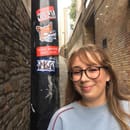The onslaught of media today is most likely unhealthy. However, there are ways to navigate the plethora of tweets, books, films and podcasts in a way that is affirming and doesn’t prompt the Instagram-era ilk of self-doubt. Choosing to engage with material that: means your access to the world is expanded; allows a deeper understanding of yourself and initiates a greater understanding of others is the healthy way to profit from our crisis-of-information era. Here are some examples.
Books
-
Becoming, Michelle Obama. This needs little explanation: It’s popular for a reason. What struck me about this was the commitment to healthy choices Obama makes throughout her life. My takeaway was that this happened due to her investment in issues outside of her own personhood. She is interested in people and makes other people’s problems her own, a certain way to get out and stay out, of your own head.
-
A Woman’s Work, Harriet Harman. Feminism in the 70’s does not look like feminism now. Initially, this is actually somewhat frustrating, especially for a younger reader. What Harman does is outline the grass-roots, essential work done to lay foundations for third-wave feminism. Childcare, maternity leave, affirmative action, all things easy to overlook when they don’t directly affect you, are all proven to be historic landmarks in the fight for equality. It outlined to me the future barriers to my equity that will arise. This is a sturdy expansion on the often meaningless, unoriginal in-fighting we hear in the left today.
-
Women & Power, Mary Beard. A short one to facilitate the heady pride that comes with actually finishing a book. Beard makes both Classics and Clinton new and urgent in this re-evaluation of modern power structures. She beautifully highlights that our society is simply set up for male power. It has a simplicity which is seductive and obvious in the nuance of conversation about female power today.
Films
-
Mistress America. Gerwig has a newfound household name ring to her nowadays. However, this indie coming of age romp was before her successes of Lady Bird and Little Women. This tale champions the unknowingness of the twenty-something years but in a hopeful way. Gerwig offers us a female mentor, and then exposes her human side and ‘fakeness’. However our heroine, Brooke, (played by Gerwig), isn’t villainised as the high-school bitch, instead, the post-glee highschool story is re-purposed for an era when your twenties are your teens, and the cliche small-town school is Manhattan.
-
(Coincidentally…) Miss Americana. Before you nonchalantly say that Taylor Swift isn’t your thing this is not so much about her, but about the media and music industry’s persecution of successful women. Putting what is undoubtedly a biased perspective aside (if we must) we see the tragic suffocation of the female voice and the optimism of the fight against it. She is minimised physically, by her eating disorder and her predominantly white male publicists make every effort for her to be apolitical, even when she tearfully riles against them.
Podcasts
-
No Country For Young Women. This is an unsung hero for intersectional feminism. Sadia Amzat and Monty Onanuga’ candidacy is modern and importantly- attractive. They nail the difficult task of making feminism an entertaining, open conversation, where it’s own racism and hypocrisy is not only dismantled but jovially ridiculed. It’s inclusive and fun. A bright antidote to white-feminism.
-
Rookie. Tavi Gevinson shot to fame in 2013 for her fashion. She later honed this into an online magazine, and space for teenage girls, a tribe whose interests are continually ridiculed as superficial. In this podcast, she uplifts voices and uses her impressive reel of contacts for sound-bites of advice for young women. Creativity, spirituality and academia are unwound in her slow and articulate conversations with the likes of Lorde, Winona Rider and Roxanne Gay.
Music
We under-estimate the potency of the messages we pump into our ears on (often) a daily basis. You are not immune to the underlying misogyny of your most-frequented club night’s closing song, or the soft, ambient slut-shaming of Cigarettes After Sex’s one-liners.
-
Alanis Morisette. She’s resurfacing, but Jagged Little Pill is still important. She takes the ‘thank u, next’ air of class and grace in ruminating about her mistreatment. It’s elegant, never self-indulgent, and confident of its own voice.
-
Lorde. She’s been mentioned before, but now go back and listen to that debut album with the knowledge she released it at 16. It is exceptional that at that age of self-important mania she managed to channel an authentic, stand-point Another case of trusting her own voice, her mode of expression is unexpected, and therefore has the rare charm of feeling personal.
-
Ariana Grande. Let’s not waste time and allow Grande to resurface as some retro Whitney moment of socially acceptable empowerment, due to a vintage, ‘re-discovery lens’. Why does guilty pleasure exist? Music is supposed to just be ‘pleasure’. It’s allowed to be fun, and I’m not sure how many young, relevant, and genuinely talented young male artists fall into the ‘I have to admit…’ category, provided of course they don’t have a young female fan base. Forget the guilt, the pink (the colour given to us) and the teenage girls (grasping onto an eligible role model for dear life). Let’s stop the comparison and pitting women against women and just enjoy a lyricist who can effortlessly weave self-respect, honesty and tragedy into easy-going, clever pop.
Social Media
-
@RachelCargle. This woman has a beautiful clarity of voice. Her tweets are informative and direct. She talks about the racist stereotype of the black angry woman, and the onus on her, and other black women to be ‘educators’. She urges white women to go and do the work herself, and unburden the black woman from yet more emotional labour. She talks about information as currency and stresses the importance of restructuring power in the form of accessible, quick reads.





